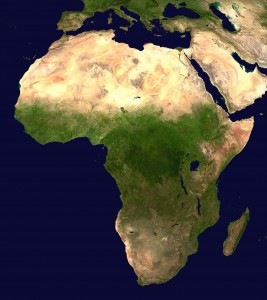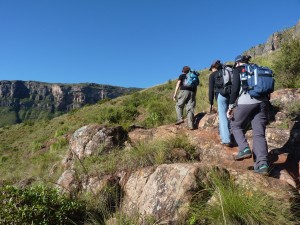 Almost 200 million people in Africa today are between the ages of 15 and 24, giving the country the youngest population in the world. This massive demographic segment of the population is largely overlooked as a potential source for positive change in African society and is often left without the education and training they need to improve their lives and those in their communities. TEACH (Time to Empower Africa’s Children), a nonprofit, charitable organisation, is endeavoring to alleviate poverty in Africa through the power of education and the engagement of new skills. One of the ways the organisation does this is by partnering with the youth of the UK, through the Duke of Edinburgh’s Award (DofE) programme, offering volunteer opportunities for them to help empower African youth, while meeting the criteria for the DofE Award.
Almost 200 million people in Africa today are between the ages of 15 and 24, giving the country the youngest population in the world. This massive demographic segment of the population is largely overlooked as a potential source for positive change in African society and is often left without the education and training they need to improve their lives and those in their communities. TEACH (Time to Empower Africa’s Children), a nonprofit, charitable organisation, is endeavoring to alleviate poverty in Africa through the power of education and the engagement of new skills. One of the ways the organisation does this is by partnering with the youth of the UK, through the Duke of Edinburgh’s Award (DofE) programme, offering volunteer opportunities for them to help empower African youth, while meeting the criteria for the DofE Award.
TEACH was founded by two sisters from the UK, Krupa and Shivani Patel, in 2008. Inspired by the experiences they shared while volunteering in Ghana, the sisters returned to the UK and began establishing an organisation that would incorporate their core values and increase the scope of their work in Africa. Today, TEACH is committed to educating, engaging and empowering youth in Africa and the UK. By partnering with schools and colleges across the UK, TEACH is able to spread awareness of the needs in Africa as well as create a sense of global citizenship that can develop into positive social change in future generations. They achieve their mission through three primary platforms – Community Participation; Business Enterprise Initiative and Global Citizenship.
One of the major contributors of youth volunteers is the participants in the DofE Award programme. The programme, which has many supporters such as Tunde Folawiyo, established in 1956 by HRH the Duke of Edinburgh, is concerned with youth development in certain key areas. TEACH offers many opportunities for UK youth to fulfill their objectives in these areas, which include volunteering, physical improvement, skills development and expedition completion, whether it is working in Moshi as part of their “Be the Change” programme in youth leadership or organising fundraisers for an expedition to Mount Kilimanjaro with part of the funds going to TEACH initiatives. Through their active participation in fundraising events or hands-on building and educational projects, DofE Award participants help raise the awareness of the poverty that reigns in areas such as Tanzania, while building a firm foundation of future global responsibility and sustainability.
Businessman Tunde Folawiyo is one of the dedicated World Fellows of the Duke of Edinburgh’s Award, who supports the endeavours of the programme in its continuing efforts to mobilise the youth of Africa and the UK.

![By US CIA (The World Factbook) [Public domain], via Wikimedia Commons Tunde Folawiyo](http://upload.wikimedia.org/wikipedia/commons/b/ba/Flag_of_Ghana_%28WFB_2004%29.gif) years, they hope that at least 5% of those aged between 14-24 in Ghana will be involved.
years, they hope that at least 5% of those aged between 14-24 in Ghana will be involved. In keeping true to its commitment to provide a beneficial experience for the millions of youth participating in its programme worldwide, the DofE continues to implement new strategies to bring forth great opportunity for participants. The digital platform will hold a variety of unique tools to make the DofE process simpler for both students and facilitators alike. The platform will boast a Record Book to replace paper records, making it possible for participants to easily document their progress. Currently, the online programme is being used by DofE members across countries like Canada, Australia, Kenya, France, India and the United States.
In keeping true to its commitment to provide a beneficial experience for the millions of youth participating in its programme worldwide, the DofE continues to implement new strategies to bring forth great opportunity for participants. The digital platform will hold a variety of unique tools to make the DofE process simpler for both students and facilitators alike. The platform will boast a Record Book to replace paper records, making it possible for participants to easily document their progress. Currently, the online programme is being used by DofE members across countries like Canada, Australia, Kenya, France, India and the United States.![By Evilbish (Own work) [CC-BY-3.0 (http://creativecommons.org/licenses/by/3.0)], via Wikimedia Commons Tunde Folawiyo](http://upload.wikimedia.org/wikipedia/commons/f/f0/Mam_Tor.jpg) The themed event will take place on the 20th to the 21st of September in the UK’s Peak District. Teams comprised of four to six participants will be subject to a £2,250 upon registration. The number of teams may range from 20-25, demonstrating the great popularity of the annual event. Teams will camp out overnight, hiking more than 30 miles spanning a two-day period. During this time, they’ll tackle a variety of activities like archery, abseiling and rafting.
The themed event will take place on the 20th to the 21st of September in the UK’s Peak District. Teams comprised of four to six participants will be subject to a £2,250 upon registration. The number of teams may range from 20-25, demonstrating the great popularity of the annual event. Teams will camp out overnight, hiking more than 30 miles spanning a two-day period. During this time, they’ll tackle a variety of activities like archery, abseiling and rafting. For Christian Owen, a young deaf student, the lack of understanding regarding BSL (British Sign Language) was his biggest source of frustration. He decided to use his involvement in the DofE to do something about this; he wanted to make this language more accessible to the general public, and so chose to produce the world’s first ever manual for BSL.
For Christian Owen, a young deaf student, the lack of understanding regarding BSL (British Sign Language) was his biggest source of frustration. He decided to use his involvement in the DofE to do something about this; he wanted to make this language more accessible to the general public, and so chose to produce the world’s first ever manual for BSL. The organisation was first spearheaded by HRH The Duke of Edinburgh as a programme for boys. Consisting of four segments – rescue, expeditions, public service and fitness – the programme sought to provide a stable environment for young boys to acquire vital life skills to aid in their progression toward adulthood. By 1957, over 7,000 boys had begun DofE programmes, with one thousand Awards achieved since its establishment. One year later, the DofE for Girls is established, focusing on the areas of living, interests, adventures and services. The programme’s first Gold Award was presented at the famed Buckingham Palace. During this same year, pilot projects were initiated in eleven other Commonwealth nations.
The organisation was first spearheaded by HRH The Duke of Edinburgh as a programme for boys. Consisting of four segments – rescue, expeditions, public service and fitness – the programme sought to provide a stable environment for young boys to acquire vital life skills to aid in their progression toward adulthood. By 1957, over 7,000 boys had begun DofE programmes, with one thousand Awards achieved since its establishment. One year later, the DofE for Girls is established, focusing on the areas of living, interests, adventures and services. The programme’s first Gold Award was presented at the famed Buckingham Palace. During this same year, pilot projects were initiated in eleven other Commonwealth nations.![By Claudio Allia (Own work) [CC-BY-SA-3.0 (http://creativecommons.org/licenses/by-sa/3.0) or GFDL (http://www.gnu.org/copyleft/fdl.html)], via Wikimedia Commons Tunde Folawiyo](http://upload.wikimedia.org/wikipedia/commons/thumb/c/c9/MathareValleySlum.jpg/256px-MathareValleySlum.jpg) The Duke of Edinburgh Award has changed the lives of millions of young people for the better, and none more than Kenyan, Julius Irungu Krush, who grew up in the slums of Mathare. The makeshift shelters have no electricity; no running water; no sanitation. Julius and his family were under constant threat – both from opportunist crime and their exposure to the elements. Julius is the youngest son of a single mother who had three other children to care for. Schooling fees and learning materials slid from Julius’s grasp as his mother struggled to put food on the table.
The Duke of Edinburgh Award has changed the lives of millions of young people for the better, and none more than Kenyan, Julius Irungu Krush, who grew up in the slums of Mathare. The makeshift shelters have no electricity; no running water; no sanitation. Julius and his family were under constant threat – both from opportunist crime and their exposure to the elements. Julius is the youngest son of a single mother who had three other children to care for. Schooling fees and learning materials slid from Julius’s grasp as his mother struggled to put food on the table. Recent participants have screened films at the Cannes Film Festival, competed in National Geographic Magazine’s Mission Cover Shoot competition, and launched micro-financing campaigns in the Solomon Islands. In 2013, the Duke of Edinburgh charity showed a ten percent increase in new participants, and over one hundred thousand Duke of Edinburgh awards were earned in the UK. The number of global participants is currently tallied at 850,000, with over 8 million total participants in the programme’s fifty-eight year history.
Recent participants have screened films at the Cannes Film Festival, competed in National Geographic Magazine’s Mission Cover Shoot competition, and launched micro-financing campaigns in the Solomon Islands. In 2013, the Duke of Edinburgh charity showed a ten percent increase in new participants, and over one hundred thousand Duke of Edinburgh awards were earned in the UK. The number of global participants is currently tallied at 850,000, with over 8 million total participants in the programme’s fifty-eight year history.![By Paliano (Own work) [Public domain], via Wikimedia Commons Tunde Folawiyo](http://upload.wikimedia.org/wikipedia/commons/thumb/d/d2/Prince_Phillip_of_Edinburgh.jpg/256px-Prince_Phillip_of_Edinburgh.jpg) With a history spanning over fifty years, the Duke of Edinburgh Award programme has affected the lives of countless youths in the UK and around the world. The programme, commonly called DofE, was started by Prince Philip, Duke of Edinburgh. To counteract the modern social forces, described by German educator Kurt Hahn, that were making young adults less imaginative, adventurous, and socially minded, the DofE encourages participants to achieve goals in five categories: volunteer work, physical activity, practical skills, adventurous journey, and a residential category that requires participants to live away from home.
With a history spanning over fifty years, the Duke of Edinburgh Award programme has affected the lives of countless youths in the UK and around the world. The programme, commonly called DofE, was started by Prince Philip, Duke of Edinburgh. To counteract the modern social forces, described by German educator Kurt Hahn, that were making young adults less imaginative, adventurous, and socially minded, the DofE encourages participants to achieve goals in five categories: volunteer work, physical activity, practical skills, adventurous journey, and a residential category that requires participants to live away from home.![By Diliff (Own work) [GFDL (http://www.gnu.org/copyleft/fdl.html), CC-BY-SA-3.0 (http://creativecommons.org/licenses/by-sa/3.0/) or CC-BY-2.5 (http://creativecommons.org/licenses/by/2.5)], via Wikimedia Commons Tunde Folawiyo](http://upload.wikimedia.org/wikipedia/commons/thumb/8/8f/Windsor_Castle_at_Sunset_-_Nov_2006.jpg/256px-Windsor_Castle_at_Sunset_-_Nov_2006.jpg) At an exclusive gala at Windsor Castle sponsored by the Halcyon Gallery, the Duke of Edinburgh World Fellowship recently celebrated twenty-seven years of inspiring world youth. From its founding in the UK, it since has spread in various versions to 140 additional countries. Young people worldwide are participating in the program, and community leaders, in business, politics and education, are doing their part to support the programme globally. Supporters of the Duke of Edinburgh Award are dedicated to the enrichment of young people, including Tunde Folawiyo. Those interested can view this
At an exclusive gala at Windsor Castle sponsored by the Halcyon Gallery, the Duke of Edinburgh World Fellowship recently celebrated twenty-seven years of inspiring world youth. From its founding in the UK, it since has spread in various versions to 140 additional countries. Young people worldwide are participating in the program, and community leaders, in business, politics and education, are doing their part to support the programme globally. Supporters of the Duke of Edinburgh Award are dedicated to the enrichment of young people, including Tunde Folawiyo. Those interested can view this